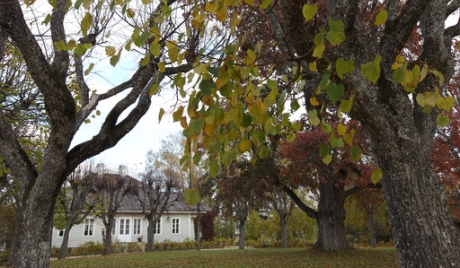Михайловское: полнота жизни / Mikhailovskoye: the fullness of life
June 6th is Pushkin Day in Russia. Russia’s most beloved poet Alexander Pushkin was born on June 6th 1799. 6 июня в России - день Пушкина. Любимый русский поэт Александр Пушкин родился 6 июня 1799г. On June 6th one hundred years ago a literary museum was opened in the poet’s family estate in Mikhailovskoye one hundred kilometers from Pskov in the north-west of Russia. Сто лет назад 6 июня в семейном имении поэта Михайловское был открыт литературный музей. Это в ста километрах от города Пскова на северо-западе России As Alexander Pushkin once put it, in Mikhailovskoye he felt that his spiritual vigor and creative potential were at their highest. Как однажды сказал Александр Пушкин, в Михайловском он испытывает наибольшую душевную бодрость и прилив творчества Mikhailovskoye today houses the State Memorial Reserve Museum, which embraces vast stretches of land known as Holy Hills in the olden days. Сегодня в Михайловском располагается Государственный мемориальный музей-заповедник, куда входит обширная местность, ранее называвшаяся Святыми Горами (Святогорьем) Back then, the territory was believed to be protected by heavenly guards. В те времена верили, что эта территория охраняется небесными покровителями The proximity of the Sviatogorsky Monastery, one of the most revered in Russia, had a profound influence on Pushkin’s work. Близость Святогорского монастыря, одного из наиболее почитаемых в России, оказала глубокое влияние на творчество Пушкина Pushkin researchers say that Pushkin wrote the character of chronicler monk Pimen in his historical drama “Boris Godunov” under the impact of the monastery and its dwellers. Пушкиноведы говорят, что Пушкин создал образ монаха-летописца Пимена в своей исторической драме "Борис Годунов" под впечатлением от монастыря и его обитателей The Mikhailovskoye museum boasts the atmosphere of provincial life. Director of the Reserve Museum Georgy Vasilevich told a Voice of Russia correspondent that now they even have a working watermill. Музей в Михайловском пронизан атмосферой провинциальной жизни. Георгий Васильевич, директор Музея-заповедника, рассказал корреспонденту "Голоса России", что теперь у них есть действующая водяная мельница "A watermill is a rarity, and there are only three such rarities in Russia. "Водяная мельница - редкость, в России их осталось всего три Our watermill is fitted with authentic grindstones, so you can watch the milling process. Жернова на нашей мельнице подлинные, поэтому можно наблюдать процесс смалывания зерна A number of exhibitions tell visitors about traditions characteristic of everyday life of the nobility in the 19th century. Ряд экспозиций рассказывает о повседневной жизни дворянства 19-ого века The culmination scene of Pushkin’s novel “Eugene Onegin” – the duel of the main characters – takes place behind the watermill. Кульминация романа Пушкина "Евгений Онегин" - дуэль главных героев - происходит позади мельницы Ancient Greeks held that you’ve lived a full life only if you have put your entire soul into it. Древние греки считали, что вы прожили полную жизнь только если вложили в неё всю душу Mikhailovskoye teaches you to live in harmony with your skills and talents, and it’s a good thing that visitors follow suit. Михайловское учит вас жить в гармонии с вашими уменями и талантами, и отрадно, что посетители музея этому следуют The magic of Mikhailovskoye is that it is permeated with artistic spirit." Волшебство Михайловского в том, что оно пронизано духом художественного творчества" One of the projects inviting visitors to develop their artistic potential is the “museum post”. "Музейная почта" - один из проектов, приглашающих посетителей развивать свой творческий потенциал One of the rooms of a cosy pub houses a post office with its own postmark and writing utensils. В одной их комнат уютного трактира находится почтовое отделение с собственным почтовым штемпелем и письменными принадлежнстями Visitors can sit down and write a letter with a goose or iron quill. Посетители могут присесть и написать письмо гусиным или стальным пером Georgy Vasilevich has this to say. Вот что говорит Георгий Васильевич "The “museum post office” began as we explained to groups of children how people wrote with goose quills in the 19th century. Музейное "почтовое отделение" началось с того, что мы объясняли группам детей, что в 19-ом веке писали гусиными перьями As became clear, the children had no idea how to write in ink. Выяснилось, что дети совершенно не представляли, как писать чернилами Now, the “museum post office” has expanded to include addressees all over the world, including Europe and the US." Теперь "почтовое отделение" расширилось и имеет адресатов по всему миру, включая Европу и США" Swarms of visitors are attracted to Mikhailovskoye to experience this fullness of life and freedom of spirit. Толпы посетителей стекаются в Михайловское, чтобы испытать эту полноту жизни и свободу духа This year abounds in all sorts of festivities in connection with the museum’s 100th anniversary. В этом году проводится множество фестивалей (праздников) в честь столетия музея People from all corners of Russia are flocking to the estate to attend the Pushkin poetry festival which began on June 3rd . Люди со всех уголков России приезжают в Михайловское на Пушкинский праздник поэзии. Он начался 3 июня |

